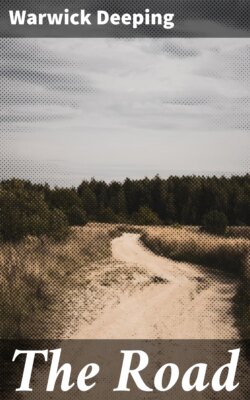Читать книгу The Road - Warwick Deeping - Страница 20
На сайте Литреса книга снята с продажи.
ОглавлениеVII
1
Table of Contents
Bonthorn received a letter. It was delivered by one of the under-gardeners from Stella Lacey.
“Dear Mr. Bonthorn,
“I am expecting Mr. Cripps on Thursday. He is over here for a month before going on to Germany and Austria. He wants to see your new delphiniums. May I book the afternoon of Friday for him? I have to sit on a committee that afternoon, but I can join you later and in time for five o’clock tea.
“Perhaps you will dine here afterwards? Mr. Cripps will be full of gossip.
“Sincerely yours,
Table of Contents
“Gloriana Gurney.”
The gardener was waiting for an answer, and Bonthorn scribbled a reply, and his fingers impressed upon the paper a faint tinge of earth.
“I shall be delighted. Please excuse the finger-mark. Your man caught me very much at work.
“I should like to show California that England can still produce something. But perhaps that’s egotism——”
While up at Lignor Mr. Stanley Shelp was displaying to the world the full beauty of a black eye which promised a procession of autumnal tints. He had been twitted about it. Old Megson, who was his chief, and according to Shelp the most querulous of dotards, had taken the opportunity of improving the occasion. He was on the lookout for such occasions, and for any opportunity of applying caustic to the superabundant proud flesh of his subordinate.
“How did you get that?”
The new dispensation was sulky. It could not tell old Megson to mind his sanguinary business. There were quite a number of people whose dream was to use such language to the Inland Revenue.
“Want it officially?”
Old Megson smiled gloatingly.
“It looks official. The real—authentic article! Almost on His Majesty’s Service.”
“The other fellow got two copies.”
“Did he—indeed? So—you didn’t run up against a door. But I shouldn’t advertise it too much.”
Shelp dealt truculently with a ledger. Obviously, the old fool was trying to be funny, but Mr. Megson with his yellow teeth and acid grin was not the absolute offence. Mr. Megson might and did vote Tory, and express himself with scorn upon the potentialities of the bright, young men, those sedulous and aggressive boy bureaucrats who propose to recreate the earth in the likeness of a government department. Mr. Megson could and did talk about camels and straws and geese that laid golden eggs. He was that sort of pantaloon, a pimp for the propertied, but Mr. Megson would die and become dust, and the voluble, wild-haired, consciously inferior young men would possess this planet.
In June Mr. Megson was a rose; in August and September a dahlia. That is to say he would arrive in the office wearing his virtue consciously like a flower, and place it in a glass jar upon his desk. The caretaker had instructions to keep the jar fresh and filled, and had Shelp been a sympathetic and wise creature and tender towards other men’s foibles he would have exclaimed: “I say, that’s some rose! Where did you get it?” Mr. Megson’s smile would have appeared less dusty. “Grew it, my lad. Queen Alexandra. I take off my hat to the rose and the lady.” Damned old potterer and sycophant! Growing flowers when there were thrones to be pulled down, and property cut up and distributed like a bloody carcase? That was a man’s job, power, passion.
Flowers! That fellow Bonthorn! Sanguinary sentimentalist, but with a most unsentimental fist.
Mr. Megson referred to Bonthorn on that particular morning, perhaps because of the rose he was wearing in contrast to his subordinate’s Susan eye.
“Yes, the cutting came from Mr. Bonthorn’s place. That’s the man I envy. Bit of a wizard.”
Shelp grunted.
“Not much use to us, is he? Not much milk there.”
Mr. Megson sorted papers.
“Gentleman. Last time he was in here we had a talk. But it doesn’t interest you, Shelp. People coming a hundred miles to see flowers.”
“Yes—who goes to see slums. Selfish swine——”
“I said—flowers. Next week is Delphinium Day at Yew End. I shall be there.”
“Delphinium Day. Sounds like Poppy Day. A six-penny save-your-face—when half the country’s starving.”
Mr. Megson looked bored.
“Why don’t you go and see a doctor, my lad. Sluggish liver. All this sitting.”
Shelp spread himself and scribbled, but from the midst of their conversation a suggestion had fluttered and fallen upon the papers like the petal of a flower. Coquelicot, flame-coloured, a little malevolent streak. It remained there with Stanley Shelp all the morning, like a blob of red ink, a provocation. His sensationalism spread itself in gestures after the fashion of the politically minded, and on that June morning he conceived a secret assassination.
At the end of the day he went out and walked, avoiding the high-road to Monks Lacey. His self-regard had put the Mill House out of bounds. He took the Southfield road, and about a mile from Lignor a deep old lane diverged and wandering as it pleased, skirted the woods west of Beech Farm. A path struck off from it, and passing mostly through woodland and along the ridge above Yew End, dropped finally into the Lignor-London road.
Stanley Shelp took that path. He was able to look down from the high woods on Yew End, and to spy out the lie of the land and the linking up of the hedges. He saw a field gate, and another and a smaller gate opening into Bonthorn’s orchard. Later there would be a moon.
